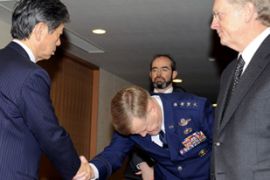Crackdown on US military in Japan
Soldiers confined to base following arrest of marine on suspicion of rape.

“This period of reflection will allow commanders and all service members an opportunity to further review procedures and orders that govern the discipline and conduct of all US service members serving in Okinawa,” a US military statement read.
Outrage
 |
| The latest rape allegations have revived local opposition to the US presence [EPA] |
Most damaging to the US military’s image in Japan was the arrest last week of 38-year-old Staff Sergeant Tyrone Luther Hadnott in the alleged rape of a 14-year-old girl in Okinawa.
The arrest sparked outrage in Japan, which hosts about 50,000 US troops under a security treaty.
Hadnott admitted to investigators that he forced the girl to kiss him but denied raping her, police have said.
The tensions have been compounded in recent days by allegations of other crimes by American troops, such as drunk driving and trespassing.
The new restrictions ban military personnel from leaving their bases except for official business, work, worship or travel to and from off-base housing.
It applies to all branches of the military in Okinawa, and marines throughout the country.
Military families and military-linked, expatriate civilians are also included.
The latest allegations have prompted comparisons with the 1995 rape of a 12-year-old Okinawan girl by three US servicemen.
That attack triggered massive protests against the American military presence.
Diplomatic fallout
| US military in Okinawa |
|
Island was returned to Japan only in 1972, 20 years after end of US occupation of rest of country Okinawa bases considered linchpin in US military’s position in Asia Island hosts most of the 50,000 US troops in Japan Residents often complain about noise and crime associated with US bases Protests in the 1990s forced closing of marine air station on Okinawa Plan to build new airstrip on island has stirred persistent opposition |
Over the past week, Okinawa’s legislature has passed resolutions demanding tighter discipline among American troops, and groups have held several protests.
In the latest demonstration, some 300 people held a meeting on Tuesday in the town where the rape is alleged to have happened.
Yasuo Fukuda, Japan‘s prime minister, has said he will discuss ways to prevent such incidents with Condoleezza Rice, the US secretary of state, when she visits Tokyo next week.
Japan‘s top government spokesman meanwhile has welcomed the new US measures announced on Wednesday.
“I appreciate what is being done, although I want to see more concrete moves to prevent this happening again,” Nobutaka Machimura, the chief cabinet secretary, told reporters.
“But as a first step, banning people from going out is meaningful.”
Washington is eager to quell rising sentiment against American troops.
Thomas Schieffer, the US ambassador to Japan, travelled to Okinawa last week to express his sadness over the alleged rape.
On Tuesday, the US military, which launched a review of anti-sexual assault guidelines following Hadnott’s arrest, said it had designated Friday as a “day of reflection” to urge its troops to adhere to ideals of professionalism.
